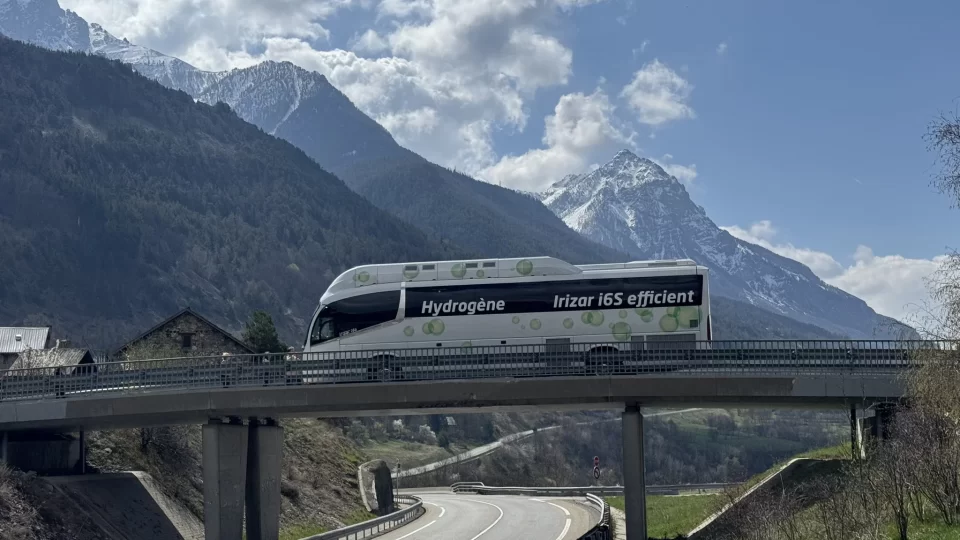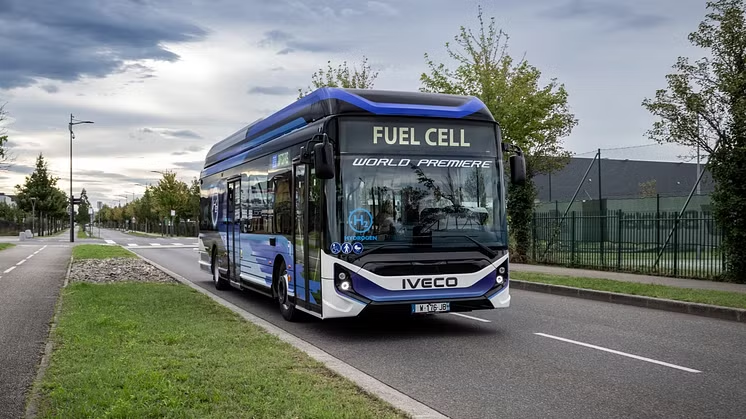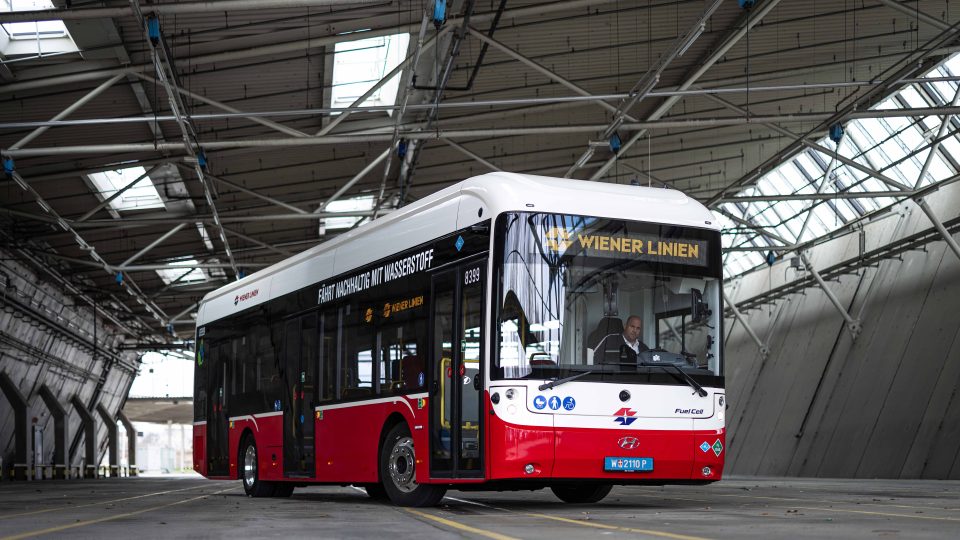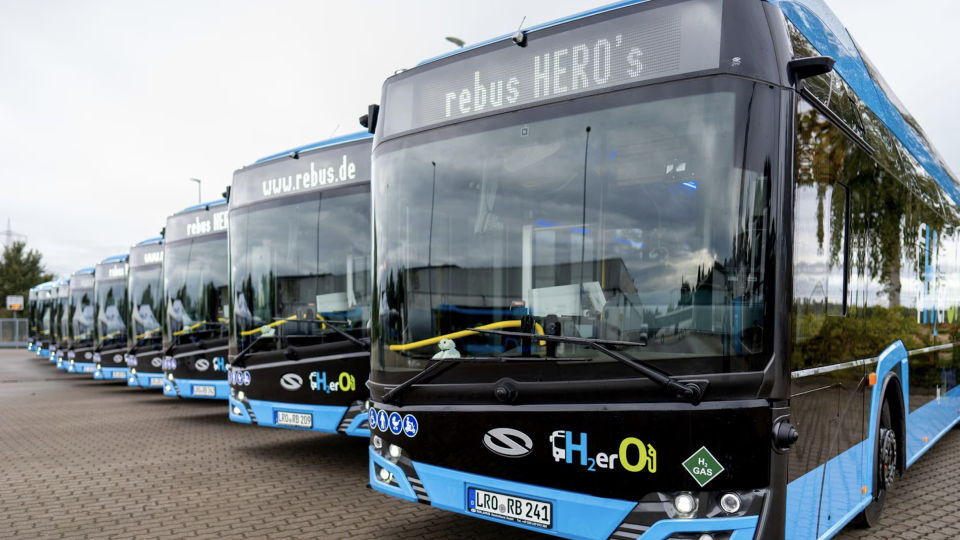The first 3 eCitaro G fuel cell from series production have been delivered in Rhine-Neckar region
Rhein-Neckar-Verkehr has just received the first Mercedes‑Benz eCitaro articulated buses from series production with a fuel cell as a range extender. The bus is said to have a range of up to 400 kilometers. It’ll be in use in urban traffic throughout the cities of Mannheim and Heidelberg in the Rhine-Neckar region. rnv has set itself […]
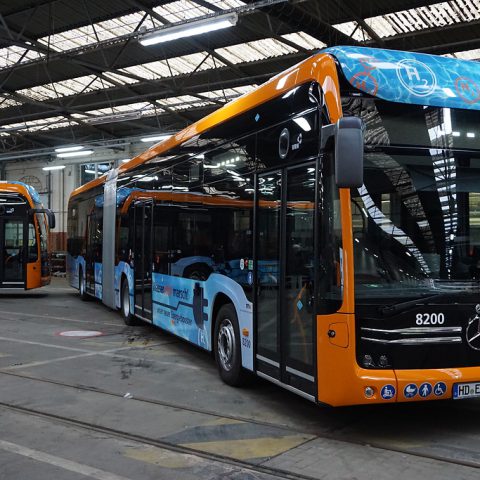
Rhein-Neckar-Verkehr has just received the first Mercedes‑Benz eCitaro articulated buses from series production with a fuel cell as a range extender. The bus is said to have a range of up to 400 kilometers. It’ll be in use in urban traffic throughout the cities of Mannheim and Heidelberg in the Rhine-Neckar region.
rnv has set itself the goal of converting its entire vehicle fleet in the Mannheim-Ludwigshafen-Heidelberg metropolitan area to locally emission-free drives by 2032.
Since 2018, the transport company based in Mannheim has already received 36 eCitaro electric solo buses and integrated them into regular service.
eCitaro G fuel cell in Rhine-Neckar region
In addition to the three eCitaro G fuel cell vehicles (the vehicle was launched at UITP Summit 2023), a further 45 eCitaro articulated buses of identical design will be delivered by mid-2025, Daimler Truck states summing up the order secured in October 2022. 40 of the total 48 vehicles will be destined for regular service in Mannheim and Heidelberg. The eight other buses will be used in Ludwigshafen am Rhein.
In addition, rnv has an order option for an additional 27 eCitaro G fuel cell vehicles, with which rnv’s bus quota can be increased to a total of 75 fully electric fuel cell articulated buses provided by Daimler Buses by 2027 if required.
rnv’s decarbonization goal is receiving support to achieve this ambitious objective through the H2Rhein-Neckar and H2Rivers funding projects.
Before the new eCitaro G fuel cell electric articulated buses are used in regular service in the rnv operating area, they will first undergo what is known as a test operation until the beginning of 2024. In addition to instructing and intensively training drivers, rnv will use this period of time for test refueling and range estimations, among other things, in order to be able to optimally design and shape operations on the routes in Mannheim, Heidelberg and Ludwigshafen. The the H2Rhein-Neckar project’s accompanying scientific research will evaluate the data from day-to-day operation and provide further indications for optimizing processes in the depot, energy consumption and route planning.
Focus on the eCitaro G fuel cell for Mannheim
The three-door electric articulated buses with fuel cell range extender each have four battery packs with the latest generation of lithium-ion batteries (NMC3) and a battery capacity of 392 kWh per vehicle. They form the basis of the power supply. The hydrogen supply of the 60 kW fuel cell is provided by six H2 cylinders, each with a capacity of five kilograms, installed on the vehicle roof. The hydrogen tanks are refueled on the right above the second axle in the direction of travel.
Both the center and rear axles of the articulated buses are powered by ZF AxTrax technology. The vehicle is driven by two low-floor portal axles with electric motors near the wheels, each with 250 kW of output.
30 charging stations supply rnv’s electric buses with electricity, supplemented by two recently completed hydrogen refueling stations. The batteries are charged with 150 kW charging capacity, and the hydrogen tanks are refueled at a refueling pressure of 350 bar at rnv depots in Heidelberg, Mannheim and Ludwigshafen or in their immediate vicinity.
The safety equipment in rnv’s eCitaro G fuel cell electric articulated buses includes a variety of state-of-the-art assistance systems. This includes the world’s first active brake assistant, Preventive Brake Assist, which was specially developed for scheduled-service buses. Together with Sideguard Assist, this protects particularly vulnerable road users.
The passenger compartment of the new buses is characterized by its appealing design. This ranges from Mercedes-Benz City Star Eco seating with 50 passenger seats, featuring seat and backrest surfaces with gray or orange fabric covers striking fresh notes, to the handrails in pastel orange and the floor in a wood look. Three double-width and electrically powered inward-swinging doors allow for a rapid passenger turnaround. Information and entertainment on board are provided by twelve double USB sockets for passengers’ electronic devices, as well as two large 29-inch TFT screens. The EvoThermatic basic roof-mounted air conditioning system with heat pump and an active filter with antiviral function, as well as additional filters for blower heaters, ensure a healthy and comfortable climate on board.
The delivery of the eCitaro G fuel cell in Mannheim
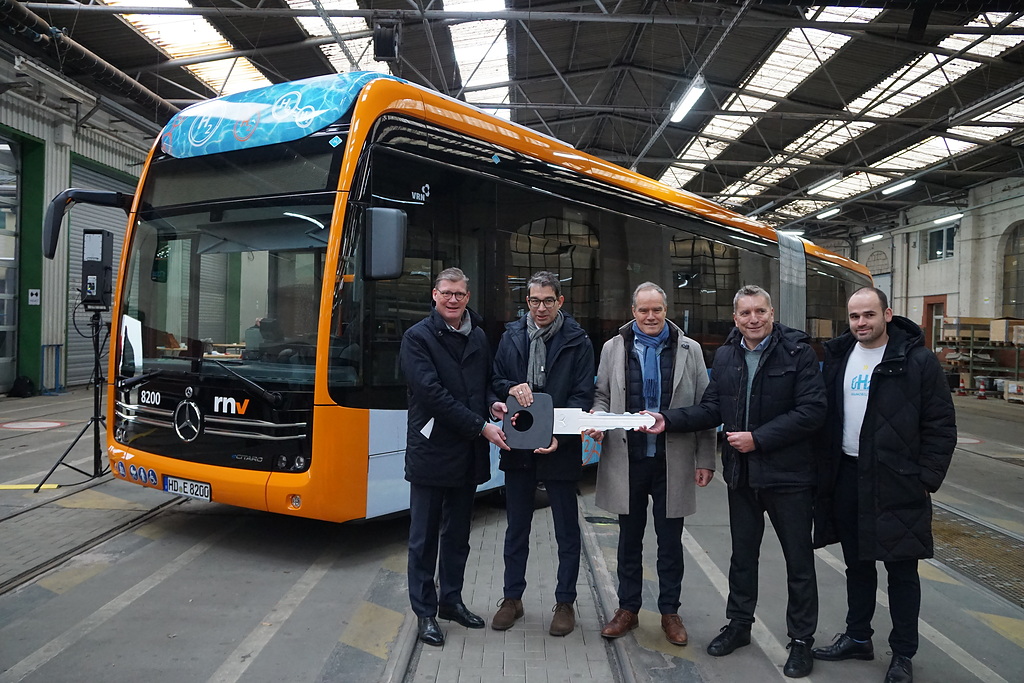
The ceremonial handover of the first three Mercedes-Benz eCitaro G fuel cell vehicles took place on November 23, 2023 on the premises of the rnv depot at Bergheimer Strasse 155 in Heidelberg in the presence of Dr Andre Baumann, State Secretary at the Ministry of the Environment, Climate and Energy of Germany’s Federal State of Baden-Württemberg. Till Oberwörder, CEO of Daimler Buses, handed over the keys of the three premiere vehicles to Martin in der Beek, Technical Director of Rhein-Neckar-Verkehr GmbH, as well as Prof. Dr Eckart Würzner, Mayor of the City of Heidelberg.
As Till Oberwörder, CEO of Daimler Buses said: “We are proud of the long-standing partnership with Rhein-Neckar-Verkehr GmbH, which is manifested in today’s handover of the first Mercedes-Benz eCitaro G fuel cell. The birth and production site of our city buses and the rnv headquarters are closely linked in Mannheim, which strengthens this site within the Rhine-Neckar region for both enterprises.”


